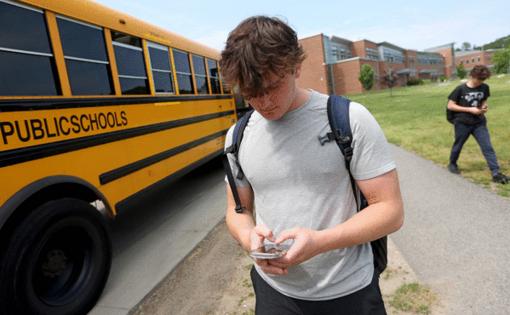Massachusetts Senate Democrats advancing 'bell-to-bell' cellphone ban in schools
Published in News & Features
BOSTON – Massachusetts Senate Democrats were preparing to advance legislation Tuesday that requires all public schools to implement a “bell-to-bell” ban on student access to personal electronic devices like cell phones during the school day.
Supporters of the proposal argued that students perform better when they are not distracted by cell phones, that less screen time encourages face-to-face interactions, which can boost relationships with peers, and that high school teachers largely find cell phones in the classrooms to be a nuisance.
Senate President Karen Spilka, who has called for a statewide cell phone ban before the start of the new school year, and Sen. Jason Lewis, the co-chair of the Education Committee, said pushing the bill forward brings the state one step closer to making schools cell phone-free.
“The cell phone is one of the most distracting devices ever created,” the two Democrats said in a statement. “Overwhelming evidence shows us that cell phones are major barriers to student growth and achievement in the classroom, and they make it harder for our talented educators to teach.”
As of last week, 32 states had a law or policy on the books covering K-12 classroom or school cell phone usage, according to Ballotpedia. Twenty-five states, including Vermont and New York, ban or limit cell phones in classrooms.
The issue has gained momentum in Massachusetts, where top Democrats like Gov. Maura Healey have publicly supported reining in cell phone usage in classrooms.
The bill Senate Democrats planned to advance out of the Legislature’s Education Committee requires all public schools and districts to implement policies for student use of personal electronic devices on school grounds and during school-sponsored activities before the start of the 2026-2027 academic year.
Those policies must include a “bell-to-bell” prohibition on student access to personal electronic devices during the school day.
The bill defines a personal electronic device as any portable electronic “capable of providing voice communication, text messaging, or other data communication between two or more parties or devices, or capable of connecting to a smartphone or other personal electronic device, the internet, or a cellular or Wi-Fi network, or provides application usage.
“Personal electronic devices include, but are not limited to, mobile phones, tablets, smartwatches, and Bluetooth-enabled devices. A personal electronic device shall not preclude the use of school-issued or sanctioned devices that serve a legitimate educational purpose,” the bill said.
Policies banning cell phones can include exceptions for school and student health and safety, “necessary accommodations” for students with disabilities, student time spent off campus traveling to or from other “learning opportunities,” multilingual learners, emergencies, and express permission from a teacher or other staff member, according to the bill.
The legislation also requires cell phone policies to include methods for parents and guardians and students to be able to contact one another during the school day if necessary.
Once the proposal clears the Education Committee Tuesday, it heads to the Senate Ways and Means Committee, which is led by Sen. Michael Rodrigues, a Westport Democrat, and serves as a clearinghouse for major bills destined for floor votes.
“As legislators, neighbors, and parents, it is incumbent upon us to ensure classrooms are places where young people focus, learn, and thrive. We look forward to seeing the bill’s continued progress as it moves to the Senate Committee on Ways and Means,” Spilka and Lewis said in their statement.
---------
©2025 MediaNews Group, Inc. Visit at bostonherald.com. Distributed by Tribune Content Agency, LLC.







Comments